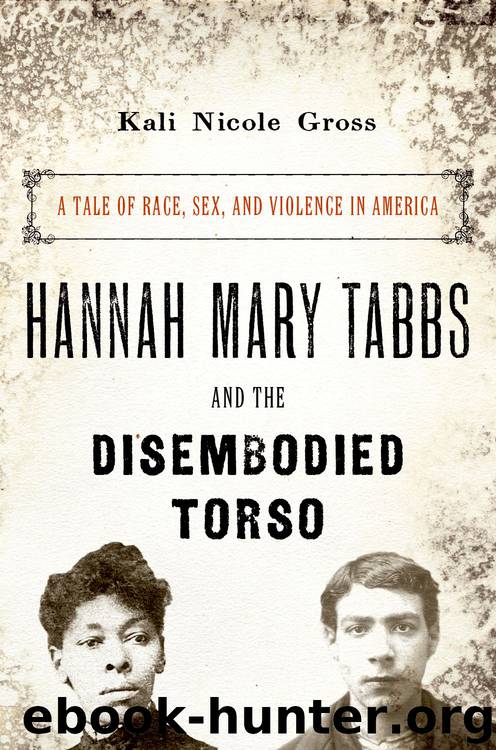Hannah Mary Tabbs and the Disembodied Torso by Kali Nicole Gross

Author:Kali Nicole Gross
Language: eng
Format: epub
ISBN: 9780190241216
Publisher: Oxford University Press
Published: 2015-12-04T00:00:00+00:00
Chapter Six
A Most Revolting Deed
Dr. Formad, the Coroner’s physician … concluded that the deceased had been butchered while still alive.
—Evening Bulletin, Thursday, June 2, 1887
George S. Costa opened for the defense. He was both aggressive and precise in his attack on the commonwealth’s case. He implored the jury to be impartial and told the men that Hannah Mary Tabbs was not to be trusted, as she was the primary reason that the police arrested Wilson—an arrest made, he pointed out, without a proper warrant. Costa went on to make more serious allegations against Francis Kelly and his men. He told the jury about Wilson’s interrogation in Kelly’s office and detailed how police insulted and berated his client to extract a confession. Detectives called Wilson a “liar and a—fool,” asserting that his “——hard head would be the cause of his neck being stretched.” They pressured Wilson saying that if he told them what they wanted to hear, “they would make it easier for him, and if not they would make it harder.” Although Wilson had denied their allegations, Costa explained that Detectives Geyer and Crawford had hounded him for a statement. Costa further highlighted how authorities took advantage of the young, frightened Wilson by taking him out to search for the missing remains while plying him with whiskey—a drink to which he was unaccustomed. It was at this time, when he was under the influence and particularly vulnerable, that they showed him copies of Tabbs’s confession in the papers. He insisted that nothing in it was true but authorities again intimidated Wilson into incriminating himself.1 The defense also attempted to cement his alibi with a bevy of witnesses who countered the prosecution’s theory and perhaps because so many of the witnesses were from the black community, they might challenge negative connotations associated with Wilson’s proximity to whiteness and his juvenile record.
Even so, Costa had taken a bold step by calling the honor of white lawmen into question on behalf of a black man. This tactic was risky because it remained unclear whether the jurors would afford a black man—any black man, but especially one such as Wilson—the same consideration or impartiality extended to one of their own race. Moreover, the jurors were not the only men to consider.
The Honorable John Innes Clark Hare was a seminal fixture in the city’s legal landscape. He authored two volumes on constitutional law, taught the subject at the Law Department at the University of Pennsylvania, and he had been practicing law for almost fifty years.2 Described as the “personification of high-bred courtesy,” Hare was regarded by many as “the most learned lawyer that ever administered justice in the courts of Philadelphia.”3 He was not above imbibing between cases nor was it uncommon for Judge Hare to cross the street from the courthouse and take “a drink of whiskey at a neighboring public bar [before] returning to his judicial duties.”4 He may well have needed that drink to help stomach the shenanigans taking place in court
Download
This site does not store any files on its server. We only index and link to content provided by other sites. Please contact the content providers to delete copyright contents if any and email us, we'll remove relevant links or contents immediately.
| African-American Studies | Asian American Studies |
| Disabled | Ethnic Studies |
| Hispanic American Studies | LGBT |
| Minority Studies | Native American Studies |
Cecilia; Or, Memoirs of an Heiress — Volume 1 by Fanny Burney(32544)
Cecilia; Or, Memoirs of an Heiress — Volume 2 by Fanny Burney(31942)
Cecilia; Or, Memoirs of an Heiress — Volume 3 by Fanny Burney(31929)
The Great Music City by Andrea Baker(31916)
We're Going to Need More Wine by Gabrielle Union(19034)
All the Missing Girls by Megan Miranda(15950)
Pimp by Iceberg Slim(14487)
Bombshells: Glamour Girls of a Lifetime by Sullivan Steve(14054)
For the Love of Europe by Rick Steves(13905)
Talking to Strangers by Malcolm Gladwell(13346)
Norse Mythology by Gaiman Neil(13345)
Fifty Shades Freed by E L James(13232)
Mindhunter: Inside the FBI's Elite Serial Crime Unit by John E. Douglas & Mark Olshaker(9318)
Crazy Rich Asians by Kevin Kwan(9277)
The Lost Art of Listening by Michael P. Nichols(7490)
Enlightenment Now: The Case for Reason, Science, Humanism, and Progress by Steven Pinker(7306)
The Four Agreements by Don Miguel Ruiz(6744)
Bad Blood by John Carreyrou(6611)
Weapons of Math Destruction by Cathy O'Neil(6264)
